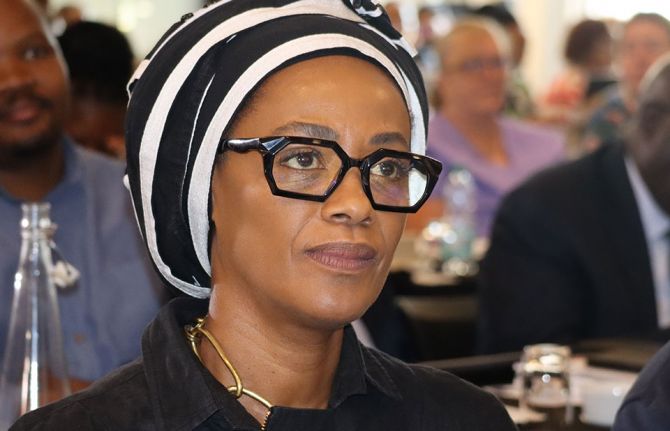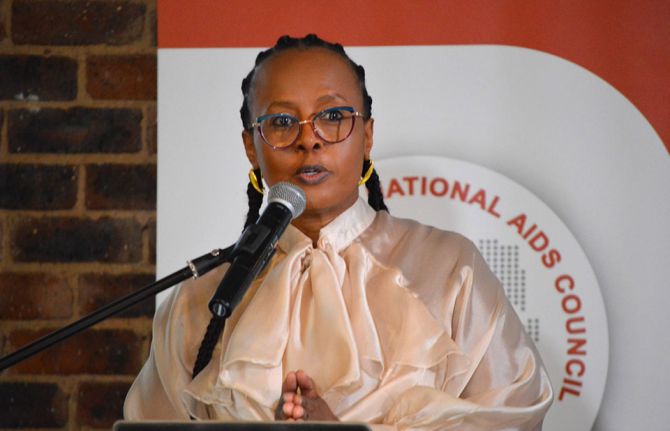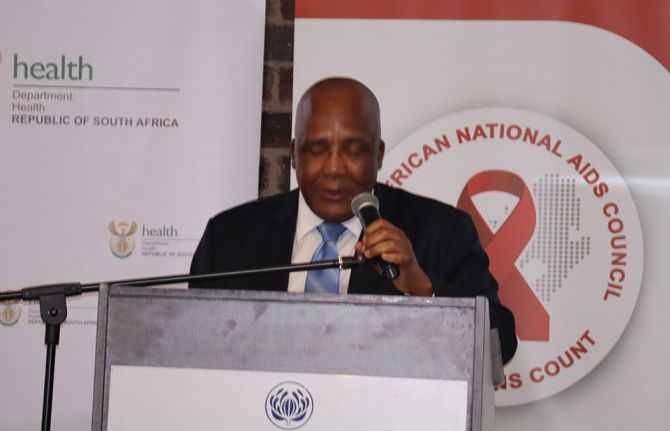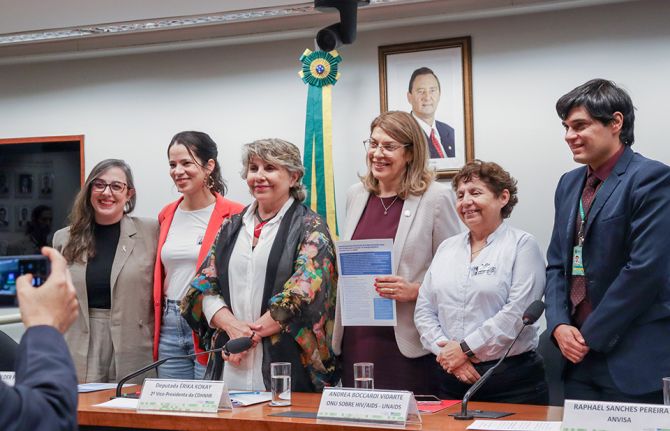




Feature Story
South Africa charts a new frontier by rolling out a twice-yearly injection which is almost 100% effective in preventing HIV
24 October 2025
24 October 2025 24 October 2025South Africa has taken a decisive step towards stopping new HIV infections. The South African National AIDS Council (SANAC) and the National Department of Health, in collaboration with UNAIDS, convened a two-day national meeting on access to a new, and potentially groundbreaking medicine (lenacapavir) which is set to be rolled out in South Africa in early 2026.
Minister of Health Dr Aaron Motsoaledi affirmed government’s commitment to make lenacapavir “a public good - accessible, affordable and locally produced”. He emphasised the importance of prioritising adolescent girls and young women. There are around 8 million people living with HIV in South Africa and every week around 1000 adolescent girls and young women become newly infected with HIV.
“The introduction of lenacapavir marks the beginning of a new phase in HIV prevention, one grounded in collaboration between government, communities, our partners like the Global Fund and UNAIDS and the private sector,” said Dr Motsoaledi. “This partnership must be accountable, transparent and inclusive if we are to achieve our national targets.”
South Africa is among nine countries globally selected to roll out the medicine under the Global Fund to Fight AIDS, TB and Malaria’s financial commitment to reach 2 million people across low- and middle-income countries.
“Science continues to offer us new tools, but innovation alone is not enough,” said Eva Kiwango, UNAIDS Country Director for South Africa. “Equity must follow. Communities, especially young women and key populations, have waited too long for HIV prevention they can trust and use with dignity.”
Through a US$ 29 million grant, South Africa will receive enough medicine to provide HIV prevention to 450 000 people at high risk of HIV during a rollout in 23 high-incidence districts across six provinces. The aim is to reach adolescent girls, young women, sex workers, men who have sex with men, people who use drugs and other at risk populations.
“We are not gathered merely to discuss a medicine, but to reaffirm our collective commitment to justice and equality,” said Steve Letsike, Deputy Minister for Women, Youth and People living with Disabilities. “No young woman, no queer person, no person with a disability must be left behind in the promise of HIV prevention.”
Across both days, a common message resonated: partnership is South Africa’s greatest strength. Dr Thembisile Xulu, SANAC CEO, called for unity of purpose noting, “We must move from conversation to coordination, and from coordination to action.”
Yvette Raphael, Co-founder of the Advocacy for Prevention of HIV and AIDS in South Africa emphasised the need to take the message to communities, saying, “Civil society must be given the tools for demand creation to provide research literacy in the way that we and communities understand.”
The evidence and the promise
Presenting findings from the PURPOSE 1 and 2 trials, Professor Linda-Gail Bekker, CEO of the Desmond Tutu Health Foundation reported 100 % efficacy among cisgender women and 96% efficacy among men, transgender and non-binary participants. She highlighted that long-acting prevention tools such as lenacapavir expand choice, strengthen agency, and promote equity, offering new hope to those who need discreet and durable protection.
Professor Helen Rees, from WITS RHI, emphasised the issue of misinformation and disinformation as South Africa prepares to roll out lenacapavir next year. She said that all stakeholders, “Must underscore the importance of science because if there is mistrust in science, people will not trust new products. As we roll out lenacapavir we must have our ears on the ground for misinformation and disinformation.”
Gilead Sciences, developer of lenacapavir, represented by Country Manager, Wendy Cupido affirmed its commitment to ongoing dialogue and partnership with the Government of South Africa and stakeholders to ensure affordable, equitable access. She noted that the manufacturer of lenacapavir Gilead remains ready to engage with the country and partners as they explore local manufacturing readiness.
Speaking during a panel discussion, young Shout Out Now ambassador, Lerato explained the impact of missing one day of oral PrEP means putting yourself at risk of acquiring HIV. She said, “I am looking forward to lenacapavir to reduce my monthly visits to the clinic to access medication and all the relevant screenings to keep myself safe from HIV. It will make my life easier.”
Dr Yogan Pillay, Director HIV and TB delivery at the Gates Foundation underlined how collaboration is transforming affordability. Recent landmark agreements secured by Unitaid, CHAI, Wits RHI and Gates will make generic lenacapavir available at a cost of US$ 40 a year in 120 low- and middle-income countries starting in 2027. “Sustainability isn’t imported -it’s built,” he said, noting the importance of local manufacturing and data-driven delivery.
The meeting entitled Lenacapavir Access and Sustainability was held in Johannesburg on 14 and 15 October, 2025. Over 100 participants participated in person and 130 joined virtually. The consultation marked the launch of the rollout of Lenacapavir in South Africa which is set to start in 2026.
Region/country
Related
 Multisectoral resilience to funding cuts in Guatemala
Multisectoral resilience to funding cuts in Guatemala

22 December 2025
 Lower prices needed for new HIV prevention medicine in Brazil
Lower prices needed for new HIV prevention medicine in Brazil

09 September 2025

